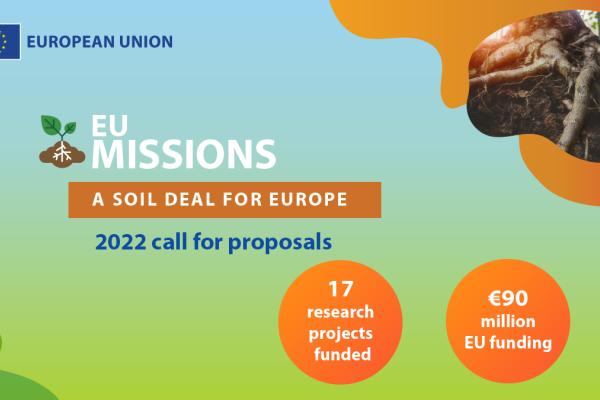The European Commission will invest €90 million in 17 new research projects contributing to the EU Mission: ‘A Soil Deal for Europe’. These projects will work on restoring and protecting soil health for the sustainable production of healthy food, protecting biodiversity, building climate resilience, and contributing to the European Green Deal objectives.
The projects gather 314 participants from 32 countries. Besides EU Member States, the countries are Horizon Europe associated countries (Israel, Kosovo, Norway, Serbia and Turkey), but also non-associated (the United Kingdom, the United States, Canada and Switzerland). The projects include universities, research institutions, SMEs, businesses, NGOs and local authorities.
They will deliver a wide variety of benefits for the restoration and protection of soil health by 2030, such as:
- Creating a knowledge and data repository to integrate research and innovation knowledge on soil and soil health;
- Reducing food processing waste and valorising residues to produce and test organic soil improvers and fertilising products;
- Delivering indicators to measure soil biodiversity and ecosystem services (e.g. agroecosystems and forest ecosystems);
- Providing tools and methods to identify sources of soil pollution, and to improve the implementation of cost-effective sustainable land management in urban and rural areas;
- Promoting the implementation of carbon farming, methodology standardisation and certification mechanisms for soil carbon accounting;
- Developing a framework to monitor, report and verify land managers’ efforts to sequester carbon dioxide and reduce greenhouse gas emissions;
- Co-creating materials, guidelines, curriculum standards, and training on soil education;
- Setting up a one-stop-shop structure to support, enlarge and promote the upcoming network of 100 Mission Soil Living Labs and Lighthouses, which will start running from next year;
- Reducing incineration, landfilling and enhance nutrient recovery from bio-waste.
The 17 new projects were selected by independent experts, following a call for proposals launched in 2022 which received 71 eligible applications. Most of the projects have already started. The projects will be managed by the European Research Executive Agency (REA). More details on the projects, including budget and beneficiaries, can be found in the overview of projects.
Source: European Commission | News (https://shorturl.at/ckxy1)
